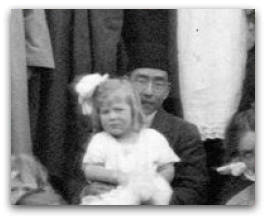Main menu
- ‘Abdu’l-Bahá’s Journey
- World Peace
- Stopping Racism in America
- Empowerment of Women
- More Principles...
- Prayer for America
Saichiro Fujita

Saichiro Fujita, known to the worldwide Bahá’í community simply as “Fujita,” became the second Bahá’í of Japanese ancestry in 1905, in California. He came to America to further his education during his teen years, and learned of the Bahá’í Faith in Oakland. In 1912 while attending school in Cleveland, he traveled to Chicago to meet ‘Abdu’l-Bahá, who invited him to travel with Him to the western United States. Fujita interrupted the course of his studies in horticulture and electrical engineering for two months to accompany ‘Abdu’l-Bahá west through Nebraska, Colorado, Utah and California. The photograph to the right was taken in October of that year, at a children’s class in Oakland, California.
In Glenwood Springs, at the Hotel Colorado, when ‘Abdu’l-Bahá and his five traveling companions were being seated in the garden patio for lunch, the hotel manager placed only five chairs at the table. When ‘Abdu’l-Bahá asked the manager why, the manager indicated Mr. Fujita, saying “He is your servant.” ‘Abdu’l-Bahá stated that no such differences existed, saying “We are all one” which “very much surprised” the waiter.
‘Abdu’l-Bahá in Their Midst, p. 207
Later, ‘Abdu’l-Bahá invited Fujita to move permanently to the Bahá’í World Center in the Holy Land after he completed his studies. He did so, looking after the needs of the visiting pilgrims during the last two years of ‘Abdu’l-Bahá’s life, and putting his acquired skills in electrical engineering and horticulture to good use there for several decades more.
Fujita was widely known and loved for his kind and unassuming nature, his depth of spiritual understanding, and his charming sense of humor. Roger White, a Bahá’í poet of note, wrote a portrayal of him. Here are a few of its lines:
Fujita With Pilgrims
“What was ‘Abdu’l-Bahá really like?”
The Master was always very kind to me.
“But what did you hear Him say?”
Everything He wanted to teach us is in His Writings and His example.
“To think you had the bounty of serving Him.”
I never felt that I could do very much for ‘Abdu’l-Bahá.
One thing I did was perhaps acceptable—
sometimes I made Him laugh.”
(Another Song, Another Season-Poems and Portrayals by Roger White: George Ronald 1979)
‘Abdu’l-Bahá’s traveling companions were often mentioned in the newspaper accounts of ‘Abdu’l-Bahá’s visits to America’s cities. One of these contains a hilarious reference to Fujita — and he, of all of the traveling companions, would have enjoyed it the most. The Sacramento Union described ‘Abdu’l-Bahá’s addresses in that city over the course of His two-day visit. It is apparent that there was a lapse between the reporter’s notes, and the typist’s transcription. Instead of stating that ‘Abdu’l-Bahá’s traveling companions were four other Persians and a Japanese, Fujita, the newspaper account said:
“‘Abdu’l-Bahá’s party is composed of four other Persians and a Japanese fugitive.”In 1906 ‘Abdu’l-Bahá had written in a tablet to Fujita:
O thou fresh plant in the garden of the Love of God!
What thou hast written was considered. It was an evidence of following in the Pathway of Guidance, and a proof of the attraction of the heart to the Beauty of His Majesty, God.
Consider what bounty God has manifested for thee, whence thou art and from whence are we. Yet, nevertheless, such a candle of love is burning in the hearts that its light is radiating from the East to the West and from the West extending to the East.
Rest assured thy name is registered in the Book of God, and it is hoped that thou mayest enter the Paradise of the Kingdom and find stability; to reach that which is the cause of the progress of the world of humanity in the world and in the Kingdom, and with perceiving eye, attentive ear, eloquent tongue and radiant face may serve in the Vineyard of God and spread the Divine Glad Tidings. If thou art confirmed as thou oughtest to be, thou wilt certainly establish an eternal Kingdom. This Kingdom is greater than that of Mikado, for the 27 sovereignty of the Emperor of Japan is for numbered days, but this sovereignty is lasting and will stand unto the Eternity of Eternities.
That sovereignty can be hidden under one handful of dust, that is when Mikado goes beneath the handful of dust, he is entirely effaced and erased, but this Kingdom withstands the greatest revolution of the worlds, and will stand with perfect stability unto eternity. The former kingdom is established by the power of the sword, burning fire, devouring, and the shedding of blood, while this Kingdom is built upon freedom, glory, greatness and the love of God. Consider how much difference there is between them.
(“Japan Will Turn Ablaze,” p. 26)
Mr. Fujita served the successive Heads of the Bahá’í Faith for nearly 40 years on Mount Carmel, ‘The Vineyard of the Lord,” in the Holy Land. He passed away in Haifa in 1976 at the age of 90, and is buried in the Bahá’í Cemetery at the foot of Mount Carmel, close by the Cave of Elijah.









